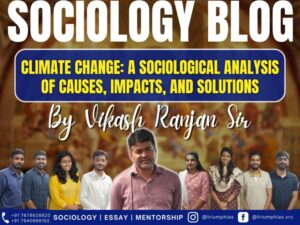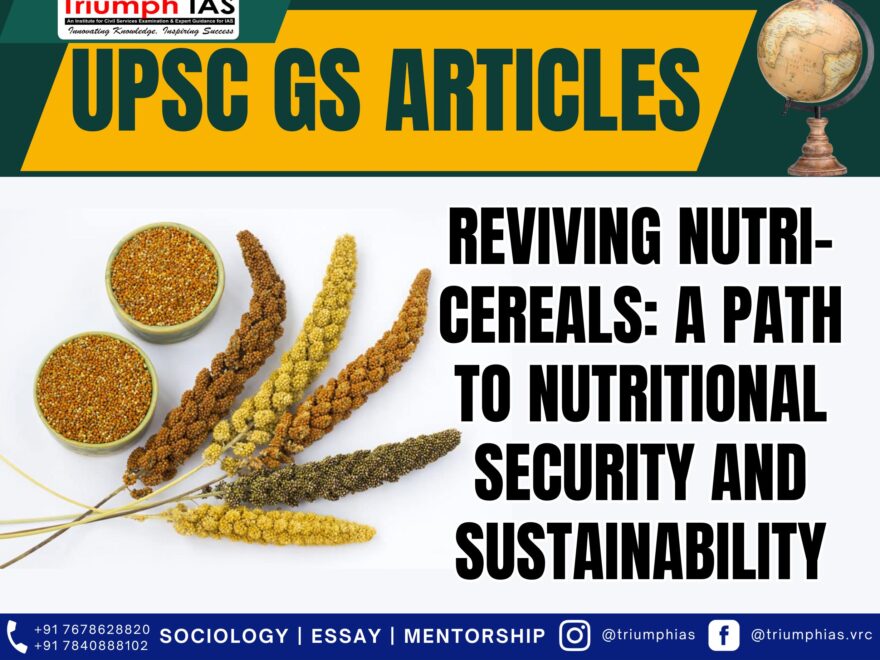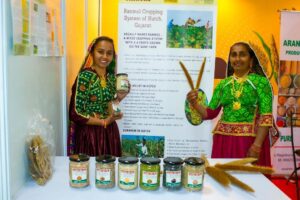Need to expand cultivation of multi –cereals
(Relevant for General Studies Paper | Economics | Prelims/Mains)

Need to expand cultivation of multi –cereals
Millets, also recognized as nutritious cereal crops, serve a crucial role in delivering vital micronutrients, including calcium, dietary fiber, protein, iron, and more. Given the widespread prevalence of micronutrient deficiencies within India’s substantial population, the ongoing reduction in the cultivation of these nutritious cereal crops presents a substantial threat to nutritional security.
Recognizing the importance of these crops and with the objective of enhancing their visibility among consumers, the Central government took a proactive measure in 2018 by issuing a notification to rebrand coarse cereals as nutritious cereals.
In order to encourage farmers to cultivate millets, the Central government has consistently announced appealing minimum support prices (MSP) for these crops. However, despite these initiatives, the cultivation area for nutritious cereal crops continues to decline.
Reason of declining Cultivation Areas of Nutri-Cereal
- Impact of the Green Revolution: While contributing to food security, the Green Revolution has also resulted in some unfavourable shifts in cropping patterns. The cultivation of water-intensive crops such as paddy, sugarcane, banana, and wheat has significantly expanded, whereas the cultivation of less water-intensive nutri-cereal crops has seen a sharp decline, plummeting from 44.34 million hectares (mha) in 1965-66 to 22.65 mha in 2021-22, marking a 49% decrease.
- Low Productivity and Inadequate Infrastructure: Challenges include subpar productivity, limited seed availability, insufficient processing and value addition facilities, and weak market connections for nutri-cereals. Historically, nutri cereals have been perceived as “economical staple foods,” facing reduced demand in favor of rice and wheat. Inadequate market demand and unattractive price incentives discourage farmers from investing in nutri cereal cultivation, resulting in diminished yields.
- Changing Dietary Preferences: People’s dietary habits and preferences evolve over time. Significant shifts in consumer preferences towards alternative breakfast options or a growing inclination for convenient foods could affect the demand for nutri cereals.
- Heightened Competition: The cereal market is fiercely competitive, offering a wide array of choices to consumers. The emergence of new breakfast products, encompassing various cereal types, granolas, breakfast bars, or yogurt-based morning alternatives, may lead to intensified competition and a decline in the market share of nutri cereals.
- Lack of Marketing Innovation: Nutri cereals may encounter challenges if they fail to implement effective marketing strategies or innovate in product development. Consumers are often drawn to novel and enticing products; hence, if nutri cereals do not capture their attention through marketing campaigns or fail to introduce fresh varieties or flavors, it could result in diminishing sales.
- Perceptions and Taste Preferences: Taste preferences wield substantial influence over the success of food products. Should consumers perceive nutri cereals as bland or unappealing in terms of taste, they may opt for other breakfast choices that are perceived as more flavorful or enjoyable.
Benefits of Increasing Cultivation of Nutri-Cereals
- Nutritional Benefits: Nutri cereals are rich in dietary fiber, iron, folate, calcium, zinc, magnesium, phosphorus, copper, vitamins, and antioxidants. They hold the potential to enhance nutritional security and serve as a safeguard against nutrient deficiencies, particularly among children and women.
- Climate Resilience: Nutri cereals exhibit drought tolerance, resistance to pests, and the ability to thrive in low-input marginal lands. They possess the capacity to adapt to shifting climatic conditions, thereby mitigating the risk of crop failure.
- Environmental Sustainability: Nutri cereals demand minimal water and energy resources, contributing to improved soil health and biodiversity. They also have the potential to reduce greenhouse gas emissions and water pollution in comparison to rice and wheat cultivation.
- Economic Empowerment: Nutri cereals can open avenues for income generation among small and marginalized farmers, particularly women and tribal communities who serve as the primary producers of these crops. Moreover, they present opportunities for value addition and processing, fostering rural entrepreneurship.
Government Initiatives
- International Year of Millets: Acknowledging the global significance of millets, the United Nations General Assembly, with India’s sponsorship, adopted a resolution designating 2023 as the “International Year of Millets.” This global recognition underscores the pivotal role of millets in addressing nutritional challenges and advancing sustainable agriculture. In India, the year 2018 was commemorated as the “National Year of Millets” to raise awareness and encourage their cultivation and consumption.
- Rebranding: To promote millet consumption, the Indian government has officially labelled them as Nutri-Cereals, highlighting their nutritional value.
- Supportive Schemes for Farmers: Under the Rashtriya Krishi Vikas Yojana, the government allocated Rs. 300 crores in 2011-12 to promote millets as Nutri-cereals. The primary objective of this initiative was to showcase integrated production and post-harvest technologies, with the aim of catalyzing increased millet production nationwide. The Ministry of Agriculture & Farmers’ Welfare is implementing a Rs 600-crore scheme aimed at expanding the cultivation area, production, and yield of nutri-cereals. The strategy involves aligning nutri-cereal cultivation with the specific topography and natural resources of each region. Additionally, farmers are encouraged to adapt their cropping patterns to suit India’s diverse 127 agro-climatic zones.
- Provision of Seed Kits and Inputs: Farmers receive seed kits and essential inputs from the government to support nutri-cereal cultivation. Furthermore, efforts are underway to establish value chains and enhance the marketability of nutri-cereals through support to Farmer Producer Organizations (FPOs).
- Increase in Minimum Support Price: Recognizing the significance of millets, the government has raised the Minimum Support Price for these crops, providing substantial price incentives to farmers. This increase has had a significant positive impact on the agricultural sector.
- Inclusion in Public Distribution System: To ensure a stable market for millet produce, the government has integrated millets into the public distribution system. This step improves millets’ accessibility and availability for consumers, further encouraging their consumption.
What could be done to increase the cultivation?
- Engagement with the Food Industry: Forge alliances with food manufacturers and retailers to diversify the array of nutri-cereal products accessible in the market. Stimulate the introduction of fresh flavours, user-friendly packaging alternatives, and inventive products tailored to distinct consumer demographics.
- Implementation of School and Community Initiatives: Incorporate nutri-cereals into school meal programs and community projects that advocate wholesome dietary practices. This may encompass the provision of nutri-cereals in school lunches, the organization of nutritional workshops, and partnerships with local entities to heighten awareness of their advantages.
- Collaboration with Healthcare Experts: Collaborate closely with healthcare practitioners, dietitians, and nutrition specialists to endorse the inclusion of nutri-cereals in dietary recommendations and therapeutic strategies for various health ailments. This endeavor can enhance credibility and instill confidence among consumers.
- Stimulating Consumer Involvement: Promote consumer engagement via contests, challenges, and social media campaigns aimed at encouraging nutri-cereal consumption. Establish platforms where consumers can exchange their encounters, recipes, and success narratives related to the integration of nutri-cereals into their dietary regimen.
Reference The Hindu
Related Blogs…
 |
 |
Frequently Asked Questions:
1. Question: Why is the decline in the cultivation of nutri-cereals considered a threat to nutritional security in India?
Answer: The decline in nutri-cereal cultivation reduces the availability of micronutrient-rich foods, contributing to nutritional deficiencies in the population.
2. Question: What factors have contributed to the decline in the cultivation of nutri-cereals in India?
Answer: Factors include the impact of the Green Revolution, low productivity, inadequate infrastructure, changing dietary preferences, heightened competition, and perceptions of taste preferences.
3. Question: How do nutri-cereals contribute to environmental sustainability?
Answer: Nutri-cereals demand minimal water and energy resources, reduce greenhouse gas emissions, and promote soil health and biodiversity.
4. Question: What are some government initiatives aimed at promoting nutri-cereal cultivation in India?
Answer: Initiatives include designating 2023 as the “International Year of Millets,” rebranding millets as Nutri-Cereals, providing support to farmers, increasing the Minimum Support Price, and integrating millets into the public distribution system.
5. Question: What can be done to increase nutri-cereal cultivation in India through consumer engagement?
Answer: Consumer engagement strategies include partnering with the food industry, implementing school and community initiatives, collaborating with healthcare experts, and stimulating consumer involvement through social media campaigns.
GS Related Practices Questions…
To master these intricacies and fare well in the Sociology Optional Syllabus, aspiring sociologists might benefit from guidance by the Best Sociology Optional Teacher and participation in the Best Sociology Optional Coaching. These avenues provide comprehensive assistance, ensuring a solid understanding of sociology’s diverse methodologies and techniques.
META TAGS:
Nutri-cereals, millets, cultivation decline, nutritional benefits, climate resilience, environmental sustainability, economic empowerment, government initiatives, minimum support price, public distribution system, consumer engagement, UPSC questions on nutri-cereals.

Why Vikash Ranjan’s Classes for Sociology?
Proper guidance and assistance are required to learn the skill of interlinking current happenings with the conventional topics. VIKASH RANJAN SIR at TRIUMPH IAS guides students according to the Recent Trends of UPSC, making him the Best Sociology Teacher for Sociology Optional UPSC.
At Triumph IAS, the Best Sociology Optional Coaching platform, we not only provide the best study material and applied classes for Sociology for IAS but also conduct regular assignments and class tests to assess candidates’ writing skills and understanding of the subject.
Choose The Best Sociology Optional Teacher for IAS Preparation?
At the beginning of the journey for Civil Services Examination preparation, many students face a pivotal decision – selecting their optional subject. Questions such as “which optional subject is the best?” and “which optional subject is the most scoring?” frequently come to mind. Choosing the right optional subject, like choosing the best sociology optional teacher, is a subjective yet vital step that requires a thoughtful decision based on facts. A misstep in this crucial decision can indeed prove disastrous.
Ever since the exam pattern was revamped in 2013, the UPSC has eliminated the need for a second optional subject. Now, candidates have to choose only one optional subject for the UPSC Mains, which has two papers of 250 marks each. One of the compelling choices for many has been the sociology optional. However, it’s strongly advised to decide on your optional subject for mains well ahead of time to get sufficient time to complete the syllabus. After all, most students score similarly in General Studies Papers; it’s the score in the optional subject & essay that contributes significantly to the final selection.
“A sound strategy does not rely solely on the popular
Opinion of toppers or famous YouTubers cum teachers.”
It requires understanding one’s ability, interest, and the relevance of the subject, not just for the exam but also for life in general. Hence, when selecting the best sociology teacher, one must consider the usefulness of sociology optional coaching in General Studies, Essay, and Personality Test.
The choice of the optional subject should be based on objective criteria, such as the nature, scope, and size of the syllabus, uniformity and stability in the question pattern, relevance of the syllabic content in daily life in society, and the availability of study material and guidance. For example, choosing the best sociology optional coaching can ensure access to top-quality study materials and experienced teachers. Always remember, the approach of the UPSC optional subject differs from your academic studies of subjects. Therefore, before settling for sociology optional, you need to analyze the syllabus, previous years’ pattern, subject requirements (be it ideal, visionary, numerical, conceptual theoretical), and your comfort level with the subject.
This decision marks a critical point in your UPSC – CSE journey, potentially determining your success in a career in IAS/Civil Services. Therefore, it’s crucial to choose wisely, whether it’s the optional subject or the best sociology optional teacher. Always base your decision on accurate facts, and never let your emotional biases guide your choices. After all, the search for the best sociology optional coaching is about finding the perfect fit for your unique academic needs and aspirations.
To master these intricacies and fare well in the Sociology Optional Syllabus, aspiring sociologists might benefit from guidance by the Best Sociology Optional Teacher and participation in the Best Sociology Optional Coaching. These avenues provide comprehensive assistance, ensuring a solid understanding of sociology’s diverse methodologies and techniques. Sociology, Social theory, Best Sociology Optional Teacher, Best Sociology Optional Coaching, Sociology Optional Syllabus.
Best Sociology Optional Teacher, Sociology Syllabus, Sociology Optional, Sociology Optional Coaching, Best Sociology Optional Coaching, Best Sociology Teacher, Sociology Course, Sociology Teacher, Sociology Foundation, Sociology Foundation Course, Sociology Optional UPSC, Sociology for IAS,
Follow us :
🔎 https://www.instagram.com/triumphias
🔎https://www.youtube.com/c/TriumphIAS
https://t.me/VikashRanjanSociology
Find More Blogs
| Compare and contrast Karl Marx’s and Max weber’s | Karl Marx- Historical Materialism |
| Talcott Parsons : Social system | Scope of the subject and comparison with other social sciences |




